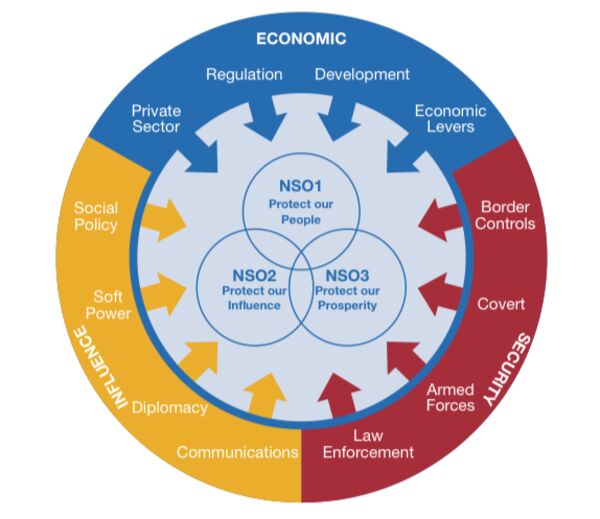Leonid Bershidsky
 Modern warfare is, in part, about marketing. So, in its National Security Capability Review, the U.K. government chose a glitzy, tech-sounded new-age name: "fusion strategy." That may have part been to avoid the term "hybrid warfare" often applied to today's Russian warfighting. The difference is subtle but important. "Call it non-linear war (which I prefer), or hybrid war, or special war, Russia’s operations first in Crimea and then eastern Ukraine have demonstrated that Moscow is increasingly focusing on new forms of politically focused operations in the future," British Russia expert Mark Galeotti wrote in the blog post that launched (to the author's lasting regret) the inaccurate term "Gerasimov Doctrine." He was referring to the 2013 speech by General Valery Gerasimov, chief of the Russian General Staff. In it, Gerasimov dissected a purported Western war strategy, employing propaganda and economic warfare to soften up the adversary for military action by special forces aided by private military companies and domestic opposition. He argued that Russia should preempt these efforts, rather than copy them.
Modern warfare is, in part, about marketing. So, in its National Security Capability Review, the U.K. government chose a glitzy, tech-sounded new-age name: "fusion strategy." That may have part been to avoid the term "hybrid warfare" often applied to today's Russian warfighting. The difference is subtle but important. "Call it non-linear war (which I prefer), or hybrid war, or special war, Russia’s operations first in Crimea and then eastern Ukraine have demonstrated that Moscow is increasingly focusing on new forms of politically focused operations in the future," British Russia expert Mark Galeotti wrote in the blog post that launched (to the author's lasting regret) the inaccurate term "Gerasimov Doctrine." He was referring to the 2013 speech by General Valery Gerasimov, chief of the Russian General Staff. In it, Gerasimov dissected a purported Western war strategy, employing propaganda and economic warfare to soften up the adversary for military action by special forces aided by private military companies and domestic opposition. He argued that Russia should preempt these efforts, rather than copy them.
The U.K.'s "fusion strategy" aims to "use our security, economic and influence capabilities to maximum effect to protect, promote and project our national security, economic and influence goals." One of the goals is to counter "a well-established pattern of Russian state aggression." So far, so predictably sweeping.
But many of the specific ideas mirror those discussed in Russia in the earlier part of this decade: Modernization of the armed forces with a focus on rapid deployment; building a stronger cyber capability and increasing recruitment of tech workers for government service; expanding the international reach of the national broadcaster and state soft power-projecting organizations; improving the domestic communication of the national security agenda, strengthening counterpropaganda efforts and increasing foreign development aid to "fragile states and regions." Everything -- economic innovation, public relations, defense capability, foreign aid -- is part of the security agenda, just like in Russia's 2015 National Security Strategy; it's a holistic approach, or a hybrid one if you like. That's a matter of semantics.

U.K. National Security Capability Review
Rival powers always portray their strategies as defensive, and in recent years, the U.K. has had a lot more right to this claim than Russia. If it took part in foreign military operations, it has been at the urging and under the direction of the U.S. As for non-conventional ops, the U.K. hasn't conducted any known cyber offensives, weaponized the BBC (whose independence is in theory guaranteed by its Royal Charter) the way Russia has done with RT or employed mercenary forces in conflicts. It has most certainly not poisoned any former double agents in foreign lands with a military-grade nerve agent such as Novichok, used to attack Sergei and Yulia Skripal earlier this month. So Foreign Secretary Boris Johnson had some justification for saying on Wednesday that "all you need to know about the difference between modern Britain and the government of Vladimir Putin" is that "they make Novichok, we make lightsabers" (the latter is a reference to the latest Star Wars movie having been produced in the U.K.).
Russia's change to an aggressive posture from a more benign post-Cold War stance occurred after Putin's government convinced Russians that everything the country did was part of national security. He was able to unite economic, technological and media initiatives under a large national security umbrella and to convince Russians they needed to keep a beady eye on external enemies. The public accepted what the state told them and so almost all spheres of Russian life became fair game for weaponization.
The U.K. has a deep, historic democracy and a fiercely independent, pluralistic media that isn't easily manipulated. But the government's intention to "create a cross-government soft power strategy," suggests it is looking to amplify its message in whatever ways possible. The document promises to respect "the independence of the BBC World Service, British Council and the many British institutions and brands that contribute to our soft power." It's difficult, however, to keep media and cultural organizations independent when they're part of a "soft power strategy" proclaimed and run by the government for national security purposes. If I worked for the BBC, especially for the World Service, I might guard my independence a little more jealously after that.
Johnson is right when he says any British soft power comes from "the power of imagination and creativity and innovation that comes with living in a free society." A government may want to contribute to boosting that power, but if its projection as part of a defense strategy crosses the line into the ugly space of propaganda and disinformation that Russia inhabits today, it will only undermine British power and influence. True soft power only works as long as it's not part of any neat circular diagram which places it in the same ecosystem as the armed forces.
No comments:
Post a Comment